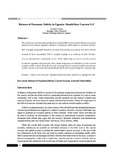| dc.description.abstract | This article uses the International Monetary Fund (IMF) external vulnerability assessment framework to analyze Uganda’s Balance of Payments (BoP) data to ascertain whether BoP is largely sustainable based on external vulnerability assessment, persistent current instead of more sustainable FDI is steadily leading to a build-up of debt. Further, reserves falling below sustainable levels. While addressing persistent current account to improve Uganda’s BoP position. Here, addressing causes of imbalances in the current account will be critical. Towards this end, ensuring value for money in public investments will be crucial in not only reducing build-up of debt but also providing the economy wide decades, it may be necessary for Uganda to take transitory measures to manage the BoP. | en_US |

